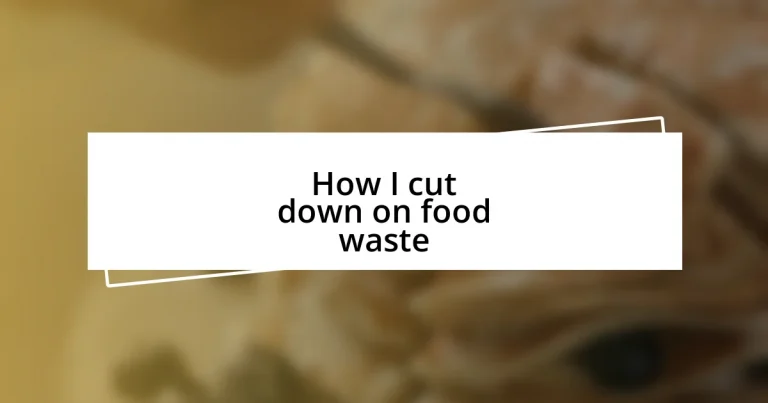Key takeaways:
- Food waste is a significant issue contributing to global greenhouse gas emissions, highlighting the need for mindful consumption and efficient meal planning.
- Adopting smart shopping habits, such as using grocery lists and being mindful of expiration dates, can greatly reduce food waste.
- Participating in community initiatives, like composting and food recovery networks, fosters awareness and strengthens community bonds while addressing food waste challenges.
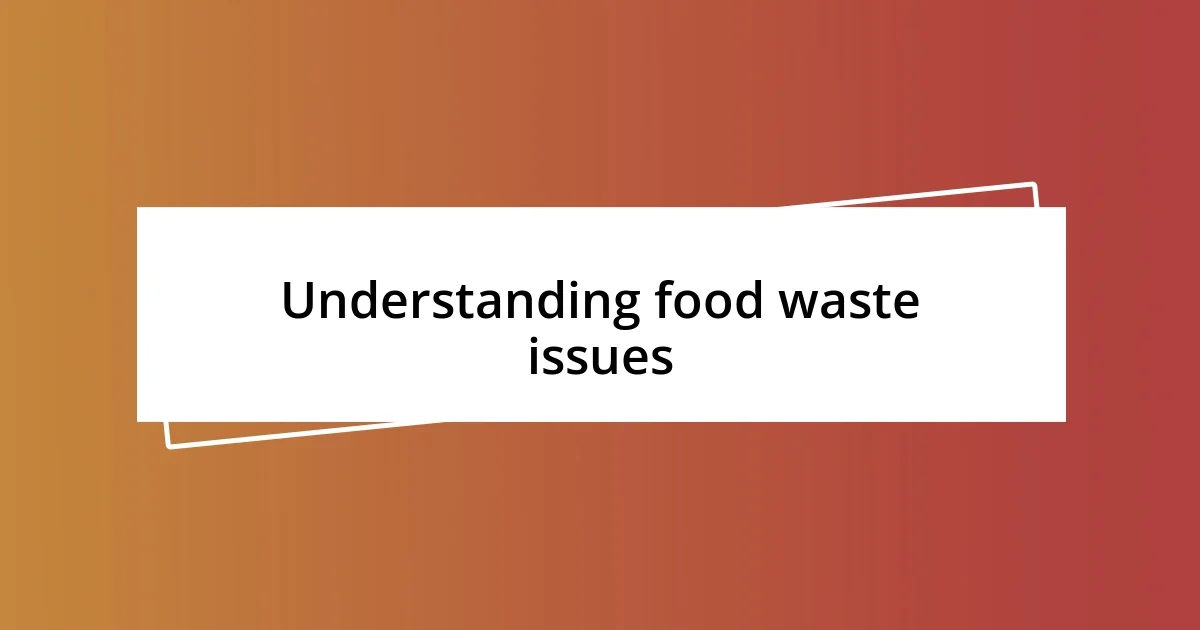
Understanding food waste issues
Food waste is a staggering global issue, with approximately one-third of all food produced each year going uneaten. When I learned that this waste contributes to around 8–10% of global greenhouse gas emissions, I felt a deep sense of responsibility. Why should so much precious food, grown with care and effort, end up in landfills while many go hungry?
It’s not just about what happens at the consumer level; the entire supply chain is fraught with inefficiencies. I recall a time when I couldn’t find the right number of carrots for my dinner—so I bought a whole bag. Before I knew it, some were wilting in the fridge while others were forgotten at the back. How often do we all fall into this trap? It made me realize how easily our habits contribute to this pressing issue.
Emotions play a huge role in how we perceive food waste. I remember the guilt I felt when tossing out food that had barely passed its “best by” date, even though it was still perfectly good. It opened my eyes to the disconnect between our food systems and our perceptions. Have you ever felt that same guilt? Understanding these emotional connections is crucial in tackling food waste and motivating ourselves to make change.
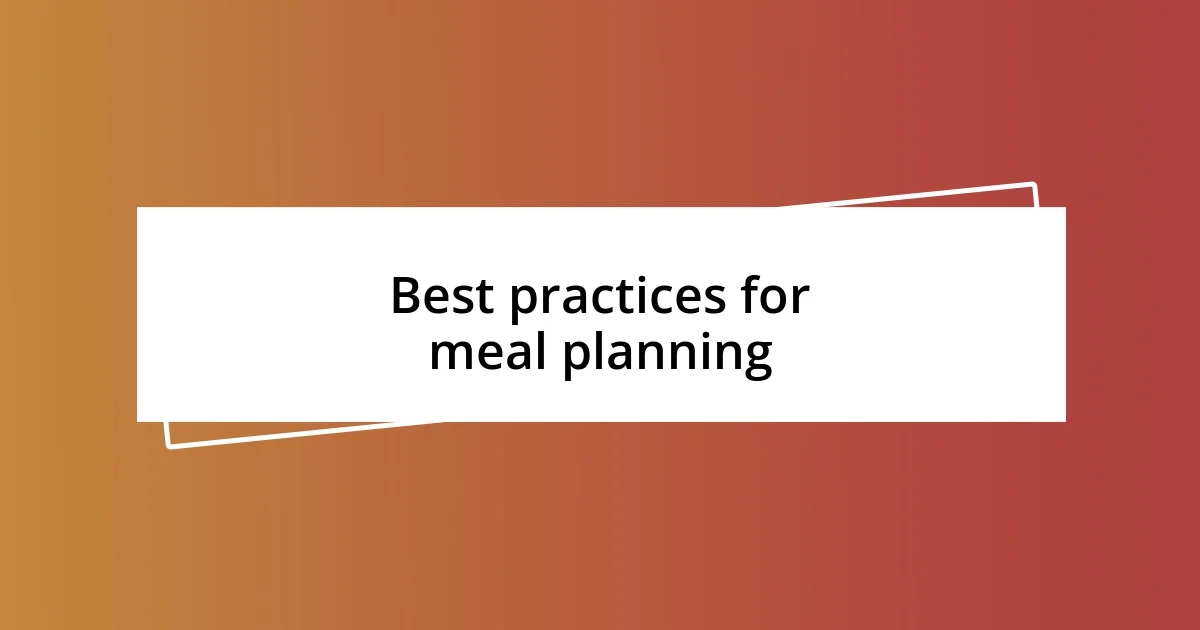
Best practices for meal planning
Meal planning can be a game-changer in reducing food waste, and I’ve found that taking the time to strategize my meals pays off significantly. In my experience, using a calendar to map out meals for the week helps me avoid impulse purchases that often lead to forgotten food languishing in the fridge. I recall a week when I carefully planned four dinners, and it felt gratifying to use every ingredient down to the last tomato.
Here are some best practices I’ve embraced for effective meal planning:
- Create a weekly menu: Jot down meals for each day, factoring in what’s already in your pantry.
- Make a grocery list: Stick to it and avoid buying items not on the list to curb unnecessary impulses.
- Batch cook and freeze: Prepare larger portions and freeze leftovers for future meals, ensuring nothing goes to waste.
- Rotate ingredients: Use ingredients that are nearing their expiration dates first in your menu, helping prioritize freshness.
- Stay flexible: Don’t be afraid to swap meals around based on what you feel like eating or what needs to be used up.
I’ve realized that meal planning not only reduces my food waste but also makes cooking feel less overwhelming. The satisfaction of knowing I’m being mindful with my food is an emotional bonus that makes dining more fulfilling.
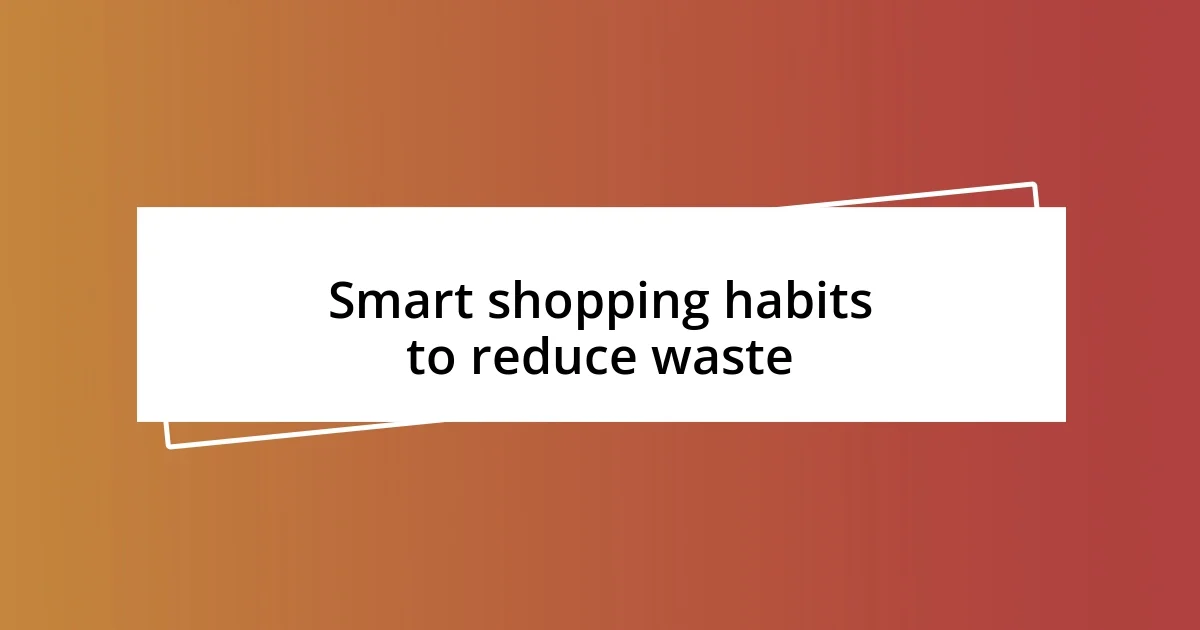
Smart shopping habits to reduce waste
When it comes to smart shopping habits, I’ve found that being intentional about what I buy can significantly cut down on food waste. One habit I adopted is to always shop with a list. This simple action transforms the grocery trip from a cluttered free-for-all into a focused mission. I remember a time when I went into a store without a list, and I ended up with a hodgepodge of items that didn’t complement each other. By sticking to a list that aligns with my meal plan, I ensure I’m acquiring only what I need.
Another strategy that has worked wonders for me is to choose bulk buying smartly. I adore the thrill of getting a great deal when purchasing in bulk, but I quickly learned that it needs to be done wisely. For instance, I once bought a large pack of quinoa, thinking it was a fantastic deal. However, I underestimated how often I’d actually incorporate it into my meals. As a result, some of it ended up stale on my shelf. Now, I always consider my cooking habits and recipes before bulk buying, which helps strike a balance between cost-efficiency and preventing waste.
I also pay attention to product labeling, especially those tricky “best before” and “use by” dates. In my experience, many items are still perfectly good long after their ‘best before’ date. Once, I almost tossed a jar of pickles that had a date from last month; however, after a quick check, I was delighted to find they were still crunchy and delicious. This taught me to trust my senses more and focus on the condition of the food rather than solely relying on dates.
| Shopping Habit | Benefit |
|---|---|
| Using a Grocery List | Prevents impulse buys and helps stick to necessary items. |
| Buying in Bulk Wisely | Reduces costs but avoids over-purchasing items that may go to waste. |
| Looking Beyond Expiration Dates | Encourages using items that are still good, aiding in minimizing waste. |
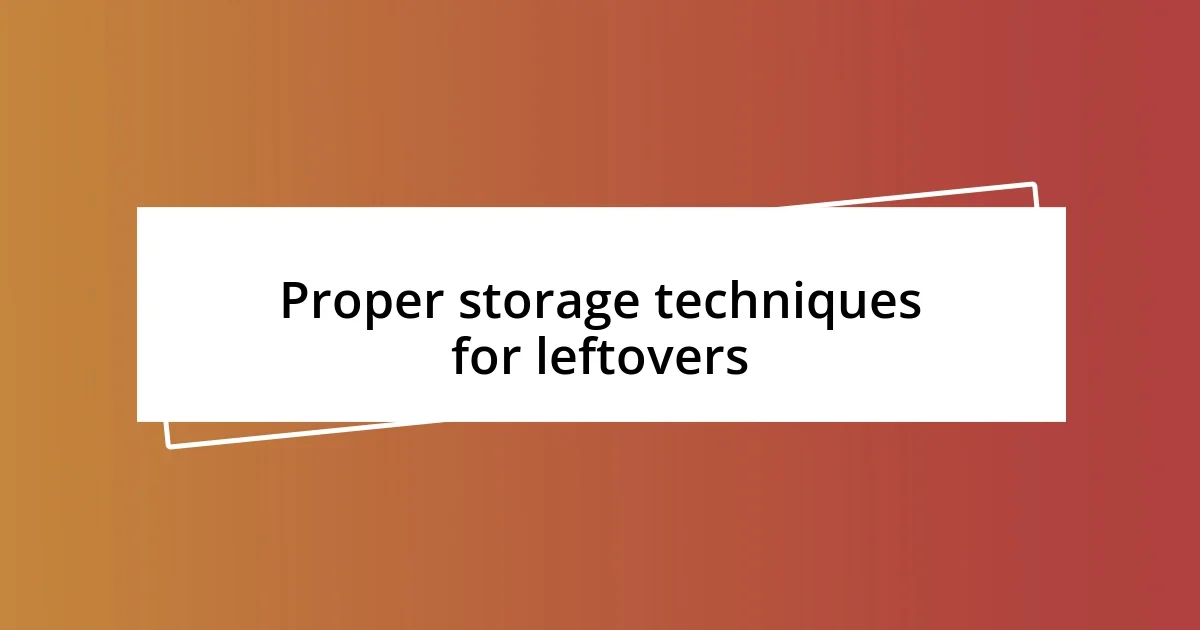
Proper storage techniques for leftovers
Proper storage of leftovers makes a significant difference in reducing waste and maximizing freshness. I remember a time when I carelessly placed any leftover food in mismatched containers, only to find them a week later, unidentifiable and sad-looking. Now, I use clear, airtight containers, which not only keep food fresher but also allow me to see what’s inside at a glance. This simple change has made me more likely to enjoy my leftovers instead of letting them fade away in the back of the fridge.
One technique I’ve come to love is labeling containers with dates. Have you ever taken a bite of something only to wonder how long it’s been sitting there? By marking the date on my leftovers, I can easily prioritize what to eat first. It’s like having a personal timeline for my food! I’ve noticed that this little habit has not only saved me money but has also improved my meal experience, knowing that I’m savoring food at its best.
I also discovered the benefits of proper refrigeration. For instance, certain foods like rice and pasta, if not cooled quickly and transferred to the fridge, can become breeding grounds for bacteria. I learned this lesson the hard way after finding some leftover rice that went bad much too quickly. Now, I make sure to let my meals cool to room temperature before sealing them up. This prevents waste and gives me peace of mind, knowing that I can enjoy my next meal without second thoughts!

Creative ways to use scraps
When it comes to using scraps, I find that creativity can turn what many see as waste into culinary gold. For example, those vegetable peels and trimmings can easily become a flavorful broth. I once had a mountain of vegetable scraps sitting in my fridge, and instead of tossing them, I simmered them with water, herbs, and spices for a rich, homemade broth. The warmth of that soup on a chilly day still brings a smile to my face.
One of my favorite ways to repurpose scraps is with citrus peels. Have you ever thought of candied orange peel? I tried it one afternoon when I realized I was tossing away the skin after juicing oranges for breakfast. Simmering the peels in sugar and water transformed them into a delightful treat. Not only did I reduce waste, but I also ended up relishing a sweet snack that complemented my baking—who knew my throwaways could taste so good?
Even bread scraps have a special place in my kitchen! I often make croutons from leftover bread pieces. A simple drizzle of olive oil, some garlic powder, and a quick toast in the oven, and voila! I create a crunchy topping for salads or soups. Honestly, it feels rewarding to know that these small steps minimize waste while adding texture and flavor to my meals significantly. How do you use up your food scraps? It’s worth exploring the unexpected delights in what we might usually overlook!
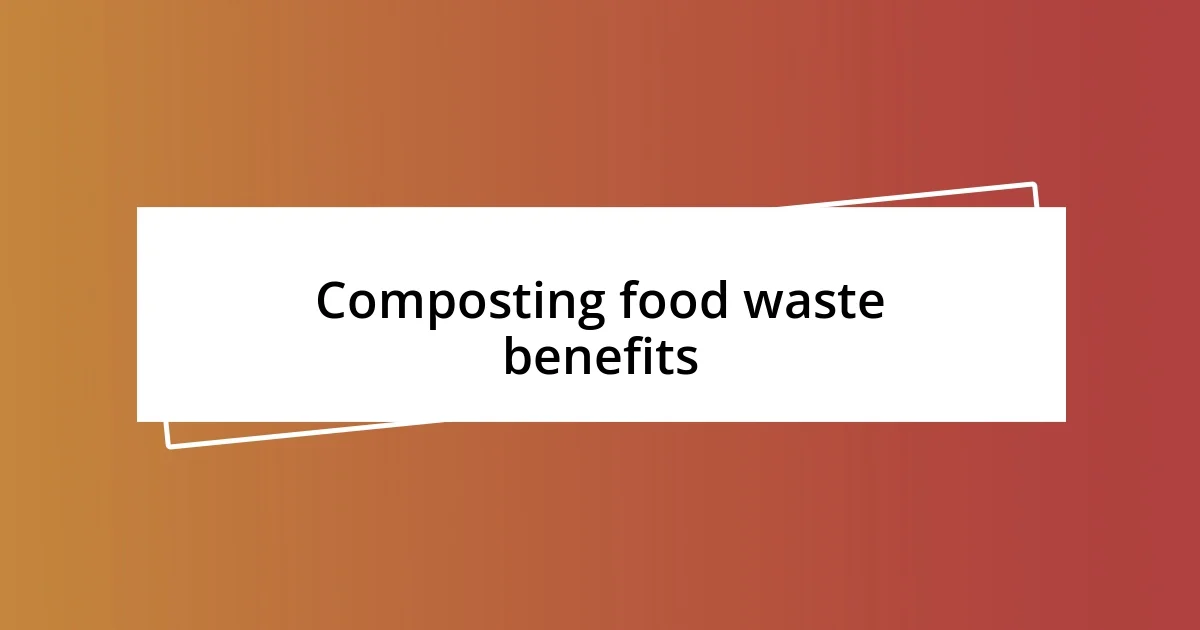
Composting food waste benefits
Composting food waste has taught me so much about sustainability and the magic of nature. When I first started composting, I was amazed at how much less garbage I had in my kitchen. Watching those scraps break down into rich soil felt like witnessing a little miracle; it’s like turning my leftovers into life! Have you ever thought about how a banana peel could become nutrient-rich compost? It feels rewarding to know that I’m giving back to the earth while reducing my kitchen waste.
What I’ve found particularly fascinating is how composting can improve soil health. By adding compost to my garden, I’ve seen my plants thrive in ways I didn’t imagine. Last year, I decided to create a little vegetable patch, and thanks to my homemade compost, my tomatoes were juicier and my lettuce greener than ever. The difference in growth was noticeable, and it gave me such joy to harvest those veggies knowing they were nurtured from my kitchen scraps. Isn’t it incredible how reusing waste can lead to such bountiful rewards?
Additionally, composting minimizes the methane emissions from landfills, a factor I now prioritize in my sustainability journey. I discovered this while reading about the environmental impacts of food waste; it sparked a deeper commitment in me. Just picturing that methane—an ozone-depleting gas—being released into the atmosphere because of what I tossed aside felt unsettling. Now, every time I toss scraps into my compost bin, I feel like I’m making a small, but significant, contribution to the fight against climate change. It’s truly empowering to know that even my kitchen habits can play a role in creating a healthier planet.
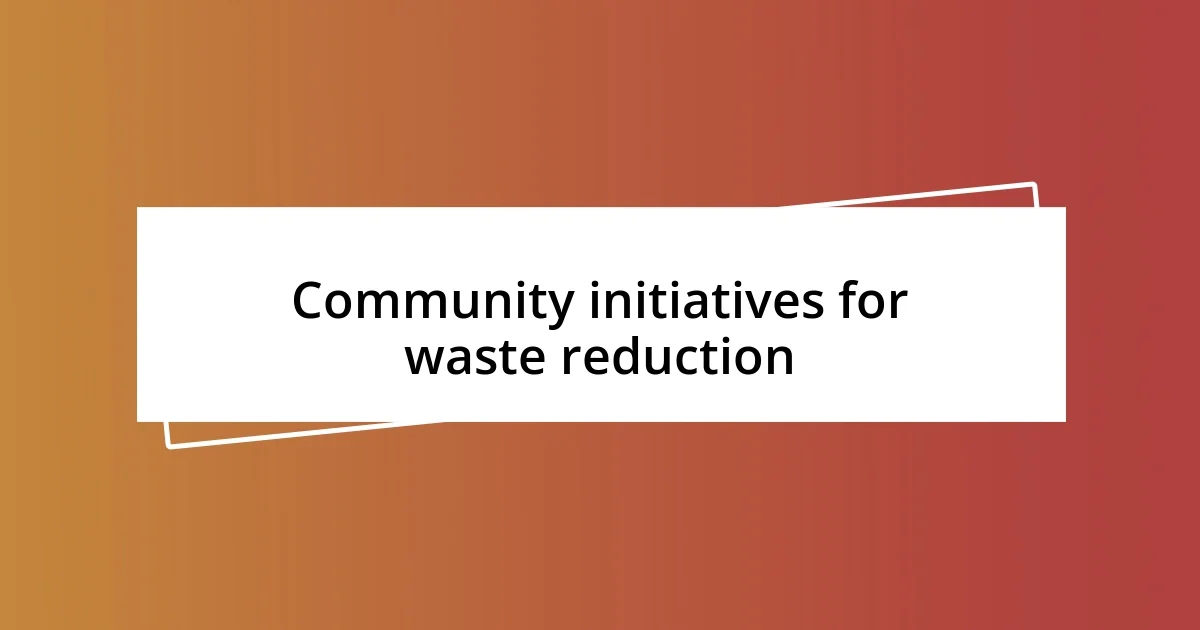
Community initiatives for waste reduction
Community initiatives aimed at reducing food waste often create a ripple effect of awareness and action within neighborhoods. I remember attending a local food waste workshop where the community shared creative uses for leftovers. It was inspiring to see everyone so engaged, realizing that each one’s small change could contribute collectively to a larger solution. Have you experienced a moment where a community initiative sparked your passion for waste reduction?
Participating in a community garden has been a transformative experience for me. Not only do I cultivate fresh produce, but we also compost waste together, creating a cycle of sustainability that feels empowering. It’s rewarding when I see neighbors gather weekly to exchange recipes and share tips on preserving food. I’ve built friendships over the shared goal of reducing waste, giving us all a sense of belonging and purpose. Isn’t it amazing how collective efforts can strengthen community bonds while tackling environmental issues?
Another impactful initiative I’ve been a part of is a local food recovery network, where we redistribute surplus food from restaurants and grocery stores to those in need. The first time I helped sort and package food, I was struck by the gratitude of receiving families. It’s humbling to know that what’s often overlooked can bring nourishment to others. How does it make you feel to know that several people can benefit from something that might have ended up in the trash? For me, it deepens the connection we have to our food and reinforces the belief that every bite truly counts in fighting food waste.












